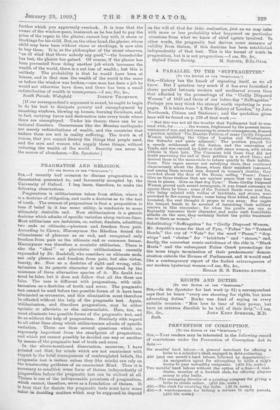A PARALLEL TO THE "SUFFRAGETTES." LTO Tits EDITOR OF T1113
..spearAros..-)
Sin,—History has the knack of repeating itself, as we all know. But I question very much if it has ever furnished a closer parallel between modern and mediaeval events than that afforded by the proceedings of the " Civilly Disposed Women" of 1643 and those of our latter-day "Suffragettes." Perhaps you may think the excerpt worth reprinting in your pages. It is taken from " A New History of London," by John Northouck, Citizen and Stationer; and the quotation given here will be found on p. 179 of that work :—
" But this was not all the trouble that Parliament had to con- tend with, for the women, frightened by the present inoon- venionces of war, and not reasoning to remote consequences, framed a petition intitlod The Humble Petition of many Civilly Disposed Women inhabiting the Cities of London and Westminster, the Suburbs and parts adjacent.' The petition prayed for a speedy settlement of the Nation, and the renovation of Trade, and was carried by 2,000 or 3,000 mean women, with white ribbons in their hats. The Commons told them they did not doubt answering the end of their petition in a short time.; and desired them in the meanwhile to return quietly to their habita- tions. This vague answer not satisfying them, thoy continued clamourously about the House, where their numbers inoeased, and among them several men dressed in women's °loathe ; they crowded about the door of the House, calling Peace I Peace I Give us those traitors that are against peace, that vies may tear them to pieces. Give us that dog Pym I ' There Civilly Disposed Women proved such arrant termigants, it was found necessary to oppose them by force : some of the Trained Bands were sent for, who being saluted with vollies of brickbats, and stones, wore provoked to fire among them: some being thus killed, and others wounded, the rest thought it proper to run away. Nor ought the trained bands to be accused of tarnishing their military renown in this encounter : for when the gentle sex can so flagrantly renounce their character, and make such formidable attacks on the men, they certainly forfeit the polite treatment due to them as women."
Substituting " Suffragettes " for "Civilly Disposed Women, Mr. Asquith's name for that of Pym, " Police " for " Trained Bands," the cry of " Vote" for the word " Peace," " dog- whips" and " chains " for " brickbats " and "stones," and, finally, the somewhat comic anticlimax of the ride in "Black Maria" and the subsequent Police Court proceedings for the more tragic termination of their predecessors' demon- stration outside the Houses of Parliament, and it would read like a contemporary report of the foolish extravagances of our modern hysterical women.—I am, Sir, &c.,
EDGAR H. S. BARNES.A.IISTIN.






































 Previous page
Previous page